Photographs: Courtesy, NIF. Manu A B in Mumbai
Sheikh Jahangir starts an old scooter at his modest car painting workshop in Jalgaon as the daily power cut begins and the electric lights, spray painting device starts working again.
While industrial units in Jalgaon, like most parts of rural Maharashtra, comes to a grinding halt due to load shedding, Jahangir's miraculous innovations have helped him move ahead in life.
Besides the mobile spray painting device, Jahangir has converted 4 second-hand scooters into super machines capable of working as a washing machine, a mobile sugarcane juice making unit, a generator, and even a flour mill.
This uneducated man's extraordinary innovation, the scooter-powered flour mill that he built 20 years ago, was also exhibited in the Hindi blockbuster, 3 Idiots.
The world watched even as Aamir Khan rode his scooter in the film. For Jahangir, who has struggled all his life, this was a great honour.
"I had mixed feelings of happiness and pride. I also felt strange when I saw my scooter designed 25 years ago in the film. Aamir Khan told him, "You are the real life Rancho. I just played the character. Good Luck."
While the reel life Rancho has everything at his disposal, Jahangir, the 50-year-old real life Rancho with a family of 9 members, lives in a rented 'one room' accommodation and hopes for a better tomorrow.
Click NEXT to read the story of Jahangir, who started working at the age of 12, often had to go hungry to support his family...
To get in touch with Jahangir, e-mail at info@nifindia.orgMobile number: 94222 82938
How Jahangir turned scooters into super machines
Image: Sheikh Jahangir.Photographs: Courtesy, NIF.
Belonging to a poor family, he had to give up studies after his 1st standard and do odd jobs to support the household. His father sent him to his aunt's place in Malkapur (in interior Maharashtra) to study. But they forced him 'to look after the cattle and made him do other household chores'.
Perhaps, this was a blessing in disguise for him. Life turned out to be his biggest teacher. His mind was always full of ideas despite his poverty and problems. He never thought any of these could actually be implemented, but no one could stop him from toying with new ideas.
People in Jalgaon called him a 'mad man'. There were only critics all along, none to guide or support him. Today, much to the surprise of the people in Jalgaon, he has worked his way to become one of India's most enterprising innovators.
"People who laughed at me take me seriously now. The media has written about me. I have got a lot of publicity. My photographs have been published in newspapers," says an excited Jahangir, who feels this recognition is something money can never buy.
Click NEXT to read about how Jahangir triumphed over all odds...
How Jahangir turned scooters into super machines
Image: James Cameroon, film director, Prof Anil Gupta, vice chairman, NIF with Jahangir.Photographs: Courtesy, NIF.
Jahangir's tale proves that necessity is indeed the mother of invention. With power cuts for 8-10 hours in a day, life is thrown out of gear in his hometown, Jalgaon.
"What is the point if the power supply comes after 8.30 at night?" he asks. Uninterrupted power supply still remains a dream. At the age of 20, along with helping his father paint cars, he started working on his dream projects: the first being a scooter-powered spray painting device.
"I have painted thousands of cars. I realised that a new device needs to be made to work efficiently. My father used the brush when the electric spray painting machines worked much faster. The frequent power failure, expensive charges of hiring the compressor from other vendors made me think about an alternate device," says Jahangir.
Click NEXT to read about how Jahangir invented his innovative machines...How Jahangir turned scooters into super machines
Image: The scooter-powered spray painting device.Photographs: Courtesy, NIF.
Initially, he developed a compressor on a Luna (a moped from the Kinetic stable). But it did not work properly.
Later, he built a scooter-based mobile spray painting device to get work done faster and easier. "I spend about Rs 4,000-5,000 to buy a second-hand scooter and convert it mainly into spray painting devices as they are in good demand. I have managed to sell about 5 spray painting machines for Rs 13,000-14,000," he says.
The unit is portable and can be taken anywhere he wishes. "I am looking for more buyers. There are people who have copied what I have done but I feel very proud to see them making use of a technology I devised," says Jahangir.
Today, he lends the 'scooter' to people in need. With one litre of petrol, an Ambassador car can be painted in one hour at half the charge of a normal painting.
...
How Jahangir turned scooters into super machines
Image: Former President Abdul Kalam looks at Jahangir's creation.Photographs: Courtesy, NIF.
He told them, "One day the world will know me."
"Today I have become famous. I have great social status now. The movie 3 Idiots has made me more popular -- like an asli (real) hero," he says. He had the opportunity to meet and talk with President A P J Abdul Kalam.
"Kalam-ji appreciated my work and said he is very impressed. I really treasure these memories. I feel really blessed."
...
How Jahangir turned scooters into super machines
Image: The scooter-powered flour mill.Photographs: Courtesy, NIF.
The scooter-powered flour mill was the best gift he gave his wife, Abida. His wife used to regularly complain about the frequent power cuts and how she could not grind wheat in the mill. She had to wait for hours at the mill before electricity was restored and the mill could work.
It was tiring for her to manage the house and run errands. This has changed now. "The scooter-powered mill runs on gas and petrol. It can grind about 50-60 kg of wheat in three hours with one litre of petrol/gas," Jahangir says.
Today, his family need not worry about power cuts, the scooter-generator supplies power to keep a light, fan and the television on.
"My wife used to ask me, 'will your innovations ever help you make money?' But now she appreciates my work and is very happy," he says.
...
How Jahangir turned scooters into super machines
Image: Scooter-powered washing machine.Photographs: Courtesy, NIF.
Jahangir laments the lack of interest among people to buy such indigenous and useful products.
There has been a good interest among people for the mobile sugar cane juice centre. It took him about 15 days to make this device. Many have expressed their interest to buy this juice unit.
The washing machine, can wash 2 shirts and 2 trousers in 2 minutes, he says. This 'washing machine' works as a front-loading machine, which helps in saving power and water. The same cylinder also works as the spinner.
Currently, the National Innovation Foundation is checking the feasibility for making this a commercial device. "This washing machine can become a mobile laundry unit in the future," says Jahangir.
So how did Jahangir's innovations move out of his workshop in Jalgaon?
...
How Jahangir turned scooters into super machines
Image: NIF's gift to Jahangir, a new workshop.Photographs: Courtesy, NIF.
Jahangir's life changed dramatically after he got in touch with the National Innovation Foundation.
"I owe a lot to the NIF and Prof Anil Gupta for recognising my work and making it popular. One of the teachers in Jalgaon helped me get in touch with NIF. NIF helped with funds, guidance and gave me a platform to exhibit my innovations. Today I have started a workshop for fabrication, welding and painting. I have started training 10 youngsters to learn a trade and be self-reliant," he says.
"To make the innovations more user-friendly and cost-effective, I need more funds. But who is there to help me? I have approached many government officials but no one has helped in any way. It took 20 years for the world to see what I made at my workshop. This year, with the help of the district collector, I manage to secure a loan of Rs 5 lakh (Rs 500,000) from the bank," Jahangir says.
"The workshop is now a fair source of revenue. I earned a profit Rs 7,000 in two weeks," he says.
Earlier, he had to work for a whole month to make a profit of Rs 5,000. A hard working and determined Jahangir spends about 12 hours in his workshop.
...
How Jahangir turned scooters into super machines
Image: Delhi chief minister Sheila Dixit with Jahangir."One must work to make your nation proud. There is nothing more satisfying than giving back to the society. Whatever I have learnt, I am giving back. I try to help people in solving their problems. It gives me the greatest satisfaction. If one action of mine can bring about a change in the society, I would love to do it," he explains.
He has already opened a workshop for his elder son. His children call him a 'scientist' and say they too would like to follow his footsteps.
"I have made sure that both my sons study well. I also send them for tuitions. I have five daughters; three of whom are married. The other two will also get married soon. I am happy that I have fulfilled my responsibilities despite many constraints," he says.
...
How Jahangir turned scooters into super machines
Image: Jahangir receives an award from Dr R A Mashelkar, Prof Gupta (R).Photographs: Courtesy, NIF.
"This book will take my story to many more people. This could spin more fortunes for me, hopefully. I hope someone will come forward to help me build and commercialise these products," he hopes.
Future plans? "I can't stop dreaming; if I do that I am dead."
An ambitious Jahangir hopes to make a cost-effective water pump for farmers. "Farmers are the most ignored people in our country. They work so hard in the field but they are not rewarded for their work, nor are they given equipment that can lessen their burden," he says.
There are many ideas in his mind. "I don't know if they will ever get a concrete shape. I have been living with my family in a rented 1 room space for years. So I also dream building my own house some day " he says.
To get in touch with Jahangir, e-mail at info@nifindia.orgMobile number: 94222 82938

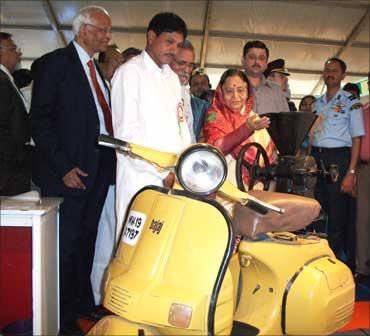
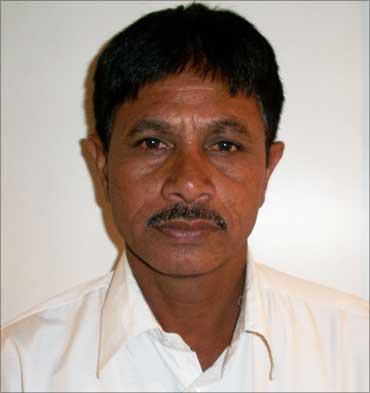
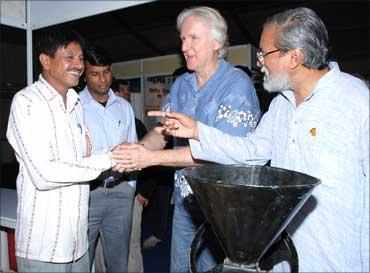
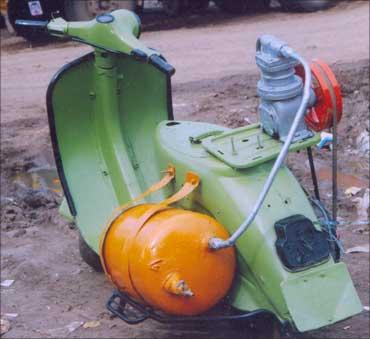
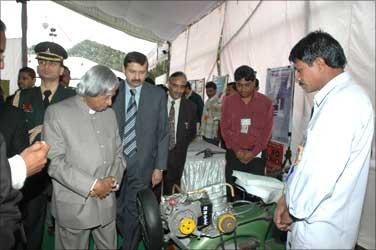
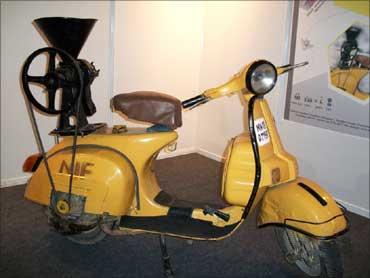
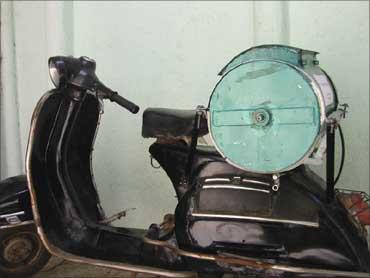
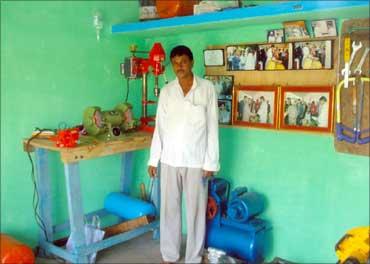
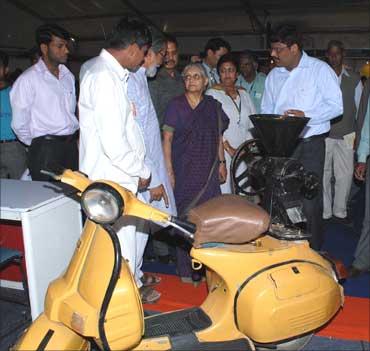
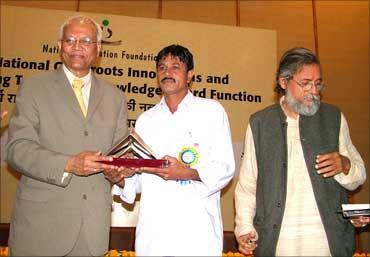
article